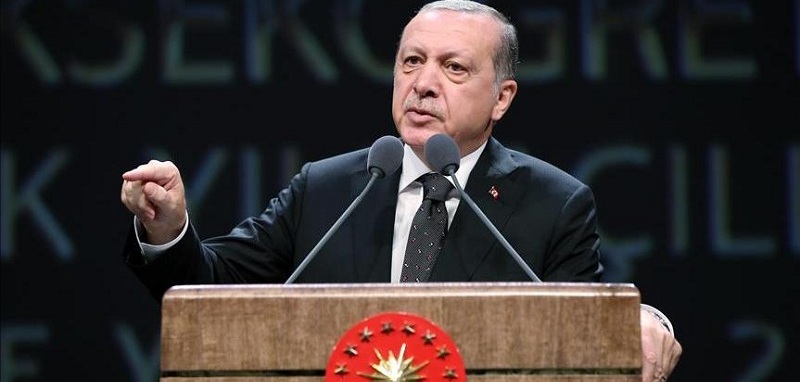Alwaght- The late September Iraqi Kurdistan independence referendum has given rise to wide range of speculations on how the regional actors will react. The Turkish reaction, meanwhile, has been given more focus and debate among responses by others.
Since 2009, Turkey and the autonomous Kurdish region of Iraq embarked on a close and massive economic and political relationship that continued to the day of the breakaway vote held on September 25. The Ankara-Erbil partnership levels were high enough to make many of Kurdish leaders hold the conviction that Turkey will give green light to the referendum, or at worst will turn a blind eye to the process. However, they miscalculated, with the field realities showing a Turkish response looming, unexpected by the Kurdish decision makers.
In fact, stronger than any other regional responder was Turkey, and notably its President Recep Tayyip Erdogan, that came clean in its opposition to the ballot. The issue appears to have occupied a large part of the Turkish leader’s obsession, with the referendum turning to be the main topic of the latest 11 speeches given by him since the vote was organized by the Kurdistan Regional Government (KRG).
Erdogan was not alone to raise his questioning voice in the country, others did, including the Prime Minister Binali Yidrim, and Foreign Minister Mevlut Cavusoglu who have been assertive in their announcing that they will not come short of measures to confront the Kurdish separatism, openly putting the military option on the table.
Now the question is why is Turkey tougher than other actors on the Iraqi Kurds for their secessionist moves? What type of threats could challenge Turkey's security once the Kurds build their own independent state?
Four reasons drive Ankara's contrariety:
Enhancing PKK position and maneuvering power
Without a shadow of doubt, the leading Turkey's security concern since 1983 has been the armed assaults of the Kurdistan Workers' Party (PKK) terrorist group against the Turkish territories. Ankara leaders one after another sought to obliterate the militant organization since its birth in the early 1980s. But the organization seemed to have augmented its combating capabilities during the nearly four decades of engagement. The PKK especially after 1997, the year it had to leave the Syrian territories and settle in the Qandil Mountains of northern Iraq, found new strategic depth as well as maneuvering potentials in confronting Turkish army that has long been chasing it in its Turkey sanctuaries, and later even beyond like in northern Iraq.
Seeking a peaceful solution for the predicament to avoid high costs, Turkey in mid-2000s involved in talks with political leaders of the KRG, an arrangement that opened the door to some agreements with the KRG President Masoud Barzani to take on the organization together. But the contracts did not appear to yield results as even presently the PKK fighters are enjoying a safe haven in Qandil Mountains, with prospects of even safer sanctuary in sight if the north officially breaks up with Iraq.
In fact, an independent Kurdistan will provide an indisputable harbor for the PKK elements. So, the most dangerous threat of a Kurdish state is securing a permanent place for the anti-Turkish militants in the mountainous north. The Turks are worried that the area becomes a launching pad for expanded military operations against Ankara.
Triggering separatism among Turkey’s Kurds
Another risk of a Kurdish state on the Turkish borders is the possible provocation of the Kurds of Turkey to seek independence. No country more than Turkey fears this issue. The Turkish-Kurdish identity gaps have remained active since foundation of the modern Turkish state in 1924. In fact, the Kurds of Turkey are poised to counter the central government. Turkey is home to between 15 and 18 million Kurds, the largest Kurdistan population in a West Asian country. As a result, the Iraqi Kurds' independence can arouse the separatist tendencies of the politically-radical Kurds of turkey. That is why Ankara is in serious distress about the Kurdish cause at home.
Risk of expansion of Kurdistan into Turkey
Another challenge is the possible support of an independent Kurdistan for Turkey’s Kurdish-inhabited parts. Iraqi Kurdistan Region's leader, Masoud Barzani, has already reiterated commitment to avoid intervention in favor of the Kurds in other countries; however, the fact is that the Kurdish leaders have constantly dreamed of the “greater Kurdistan” state. They in various events talk about building an inclusive Kurdistan nation, covering all of the Kurdish minorities in regional countries. Given these dreams, a future state will threaten the Turkish national security if Iraqi Kurds push for getting Turkish Kurds on board of their newly-established state.
Things could go complicated since according to the international law, Turkey cannot violate national sovereignty of an independent state. Odds are that, pariah state and devoid of a close regional ally, Kurdistan will desperately ally with the Israeli regime and the US and allow them to set up their military bases on its soil. Once these steps are taken, Ankara will be stripped of its military pressing instruments in the face of Erbil measures. So, the greater Kurdistan has been and remains a substantial jeopardy to the Turkish government.
With the three risks in mind, the independent Kurdistan state imposes serious risks to the Turkish national security and interests. This is what that stirs the Turkish leaders to grow more concerns than any other country about potential Kurdish breakaway in Iraq. The threat is so robust in the eyes of Ankara that is expected to extraordinarily impact the short-term Turkish interests coming from trade with the KRG. With perception of the dangerous consequences of Kurdish independence widely held by Turkey, the Turkish officials are expected to even toughen their stances against the referendum outcomes.



























